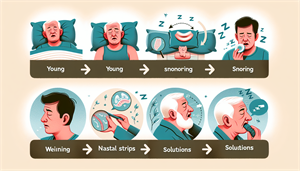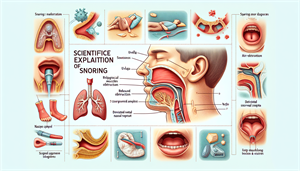
Why Do We Snore as We Age: Causes and Solutions for Better Sleep
Snoring, a frequently joked about but less frequently understood nighttime nuisance, is a well-known bedfellow of many. It’s characterized by that all-too-familiar, less-than-melodious sound we produce when our breathing is obstructed in some way during sleep. While snoring can occur at any age, have you noticed it becoming more prevalent as you or your loved ones get older? It’s not just your imagination - snoring does indeed become more common with age. But why do we snore as we age? Let’s delve into the science behind this nocturnal symphony.
Key Takeaways
Aging increases the likelihood of snoring due to weight gain, particularly in the neck area, loss of muscle tone in the throat and soft palate, and, in women, hormonal changes during menopause. Obstructive sleep apnea, characterized by repeated breathing interruptions during sleep, becomes more common with aging and is associated with serious health risks such as heart disease and stroke. Various treatments include CPAP devices, lifestyle changes, and, in severe cases, surgery. Lifestyle factors like alcohol consumption, use of sedatives, smoking, and poor sleep hygiene can exacerbate snoring in older adults, while solutions for reducing snoring include weight loss, use of nasal strips and decongestants, and treating sinus issues.
Age-Related Factors Behind Snoring
Snoring, often seen as a common sleep disorder, is a result of narrowed or partially obstructed air passages in the upper respiratory system. As we age, there are several factors that could elevate the chances of snoring, including weight gain, loss of muscle tone, and in women, hormonal changes during menopause. These factors can cause the narrowing or blocking of airways, leading to sleep apnea or obstructive sleep apnea, conditions where breathing periodically stops during sleep. Snoring can then become not just a nuisance, but a significant health concern. We will now examine these factors in detail.
Weight Gain and Neck Circumference
It shouldn’t come as a surprise that weight gain can contribute to snoring. But did you know that it’s weight gain specifically in the neck area that plays a significant role? Excess weight in this region can narrow the air passages, obstructing airflow during sleep and causing the airway to collapse, ultimately leading to snoring. Indeed, a direct association exists between a larger neck circumference with an increased risk of snoring and sleep apnea. In men, a neck circumference exceeding 17 inches, and in women, exceeding 16 inches, is deemed a risk factor for these conditions. This means that reducing neck circumference can lessen the severity of snoring, which is especially beneficial for individuals with high blood pressure, as snoring and sleep apnea can contribute to elevated blood pressure levels.
Loss of Muscle Tone in Throat and Soft Palate
Muscle tone - it’s not just for your biceps and abs. The muscles in your throat and soft palate also need to maintain their tone to prevent snoring. As we age, the muscle tone in our throat and soft palate decreases, leading to weakened upper airway muscles during sleep. This can cause the airway to become obstructed, resulting in snoring. However, the issue extends further. This weakening of the muscles can contribute to cardiovascular disease if left untreated. So, what can be done about it? Specific exercises exist and therapies, such as myofunctional therapy, designed to strengthen these muscles, helping individuals lose muscle tone in the throat and soft palate.
Hormonal Changes During Menopause
For women, the stage of menopause brings about numerous changes, one of which includes a decrease in muscle tone that can contribute to snoring. This is due to a reduction in estrogen levels. Estrogen promotes muscle repair and growth, so when its levels drop, it leads to: the disa


